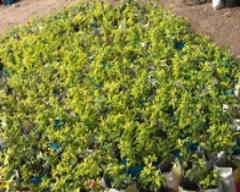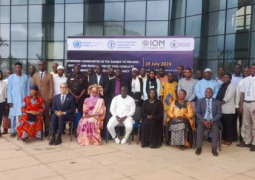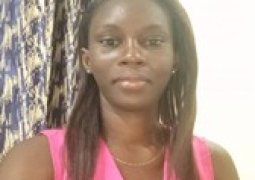
Floriculture is the growing of flowers and the sector is among those that are affected by the pandemic.
This medium visited the tourism areas to engage some vendors on the impact of Covid-19 and how this year’s tourism season is unveiling.
Madam Thelma Ndella Cole, vice president of the Floricultural Association Garden on the Bertil Harding Highway, said it has been very difficult for them as gardeners since the covid-19 outbreak.
“From the onset, the cure to covid-19 and precautions were the focus of people. So buying flowers was the least people could think about. So our business was down. If I say down, I mean our business was and still is down for about a year, most of us depend on growing and selling flowers for our livelihood, we live by hand to mouth, this is where we feed our family. It has been very difficult for us because we have not been seeing people coming to buy flowers or even old customers to come and patronise us.
“Looking at the tourism sector, hotel owners come to buy flowers from us to beautify their hotels for tourist attractions, but with the advent of Covid-19, most hotels are closed and tourists are not coming in. So they are no longer buying flowers, and they are one of our biggest clients,” she said.
Modou Keita, a vendor who sells flowers at the Bertil Harding Highway, said they are affected in every 100 sales. According to him, if the profit was 80, currently it has dropped to 20 in a 100. “This is how bad our businesses have been affected,” Keita said.
A vendor who preferred to remain anonymous and spent most of his life selling and growing flowers, laments the low income sales since Covid-19 erupted.
“I have been growing and selling flowers here for over 14years. Since the corona struck, sales have dropped, and it has been this way for the past years. I just hope and pray that Corona is finally gone, because this is my source of living, I depend entirely on this business to feed my family and it has been very difficult for me since then. The tourism season is like any other season these days because it makes no difference, my business used to be very lively and profitable, but not anymore,” he said.
Mumin Baldeh, PRO Gambia Association Floricultural, said: “Most part of my garden is empty and dry, there are no flowers growing there for the past one year and six months most especially when it just hit.”
“Almost all our customers are not showing up, due to the Covid-19, hotels werenot operating, borders closed and people are not coming in. Hotel areas are most of the time our targeted areas, these are the people that buy most of our flowers, even if they don’t come to us we go to them to showcase our new variety of plans, but we could not have access to see them because most of them are scared of the people from outside because they believe we can bring covid-19 to them by letting us in or meeting with them in their places. So that really affects our businesses and put our sales on hold,
Mumin said, things are, however, changing in the past two months.
Musa Sambou, vendor at Traffic Lights, said: “My old customers are still coming. Covid-19 has affected my relationship with customers and passers-by. In those days when customers came to buy flowers, they got down from their cars or took a close look at my product, but since corona struck customers stood far away when speaking.”
An assessment released by the Gambia Tourism Board in May estimated that it may lose up to US$108 million (5.6 Gambian delasi).
Tourism contributes 20% of Gambia’s GDP but the sector has been grounded to a halt since March when the small nation registered its first case of COVID-19.




